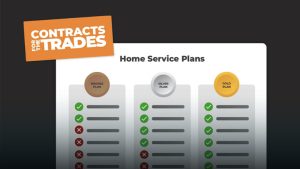What Did We Learn In 2019? Customer Experience, Productivity Tips And More!
December 31, 2019 | Read: 11 minutes

2019 was a big year for the field service industry. Coming to terms with changes in workforce and legislation, adapting to the ever-growing automation trend, and the continuous need to implement digital solutions has been on many an owner’s and manager’s mind.
Investing in and optimizing their mobile job management software has definitely become a preoccupation for the forward-thinking leader.
The general theme of what our readers wanted to know revolves around actionable decisions and dealing with the ups-and-downs of running a field service business, whether they specialize in plumbing & heating, HVAC, fire & security, electrical or any other.
From general improvements to training technicians and A LOT of productivity tips, 2019 has been a ride. But we don’t want to spoil anything so read on to find out the most popular Commusoft articles of the year:

10. How to improve the field service customer experience
Considering how much of a buzzword “customer experience” has been this year, it’s no wonder our complete guide on improving your field service company’s offering has been a popular read.
Getting a mobile job management software that comes with customer-centric features can make a world of difference and if keep your customers happy isn’t enough motivation, then Walker published a study showing how experience is set to overtake price in 2020 as the key decision factor for the majority of people, regardless of the type of product or service they’re purchasing.
This effectively means that if you service is top-notch, then you price can match it. Read all about how the new customer wants to be kept in the loop, aware of where their tech is at all times, and how to keep them satisfied when the smallest hitch in the journey can lead to seriously negative (and public) reviews.
9. How to train technicians for customer service
Leading on from the previous article, it’s only natural to have training for field service customer service as our next most read piece. At the end of the day, it’s the easiest place to start from. Because we believe in teamwork and consulting the experts, we’ve asked our friends at Forgely, the top people management and hiring platform for field service businesses, to give us their top tips.
It’s only natural that getting techs comfortable with a mobile job management software is a big part of training with customer service in mind. Knowing that no matter what the expectations are, they’re always ready will boost a technician’s confidence and motivate him to work harder as well as smarter. Speaking of working smarter…
8. The best productivity tips for field service technicians
Boosting productivity is one of those perennial goals we see in every business’s start of the year resolutions but it rarely works out the way managers imagine. You see, talking the talk is easy, but where do you start walking the walk? By consulting the experts, of course!
By the end of this list, you’ll see that we’re not the only fans of this strategy – our readers seem to agree it’s best to learn from those who’ve tried it themselves.
Go on to read about a cash flow expert’s method of calculating productivity, a field service business coach’s strategy to get employees accustomed to these goals, a best selling author and HVAC consultant’s top 2 recommendations on how to track your progress, and how mobile job management software plays into you crushing your targets.
7. What you should charge for your service?
This is an age-old question and the reason behind it is that it’s a common thing in the field service industry for technicians to open their own business. Sure, they’re very good at, let’s say, selling the benefits of installing a security system, but they’ve never had to sell themselves. This is why we wrote down a simple method to calculate what price you should charge for your service.
Turns out, there’s a lot more to consider than the price of parts and the value of your time. From fuel cost to rent to taxes and even your very address, we take it all into account and factor in a profit for your business as well.
Pricing shouldn’t be a fight to the bottom but a fair remuneration for the value you’ve provided a customer with. Imagine if their heating system breaks down in the middle of an Alaskan winter. A good plumber will be worth their weight in gold then.
6. How to get more positive reviews for a plumbing and heating business
As you can see, we’re moving down the buyer’s journey to another key purchasing factor: reviews. As you’ll see in the article, BrightLocal found that 86% of consumers read reviews before hiring even local businesses. It doesn’t help that few people keep leaflets and cards around with your contact info. Why would they?
After all, it only takes a few taps on a phone or asking Alexa to call the nearest electrician in order to reach one. But this means that your Google My Business or Facebook Business profile is the first thing they’ll learn about your company and what’s displayed front and center in these listings? Ratings.
Whether it’s stars or grades, you’ll want to keep these numbers positive and the reviews consistent. However, nothing is more suspicious than a company with 100% positive reviews so how do you balance honesty with the need to impress a potential customer before they even pick up the phone?
You’ll have to check out our complete guide for the answer to that!

5. Complete guide to increasing productivity in a field service business
Productivity is always on a good manager’s mind so we’re not surprised to see another piece on this topic ranking so high. If the previous entry didn’t tip you off (pun definitely intended!), increasing efficiency is worth it.
After all, if you can fit in even one extra job per day without increasing your costs, then that extra job is almost all profit (minus the cost of parts, of course)! This being said, the complete guide starts from the beginning and it’s an excellent resource that will walk you through every facet of a field service business, account for both companies with and without a mobile job management software, and suggest easy-to-implement changes that make a big difference.
You’ll see some of the experts show up again to offer advice as well as the way we set the record straight on what is a productive company. The fact of the matter is that simply breaking even at the end of the month isn’t succeeding, it’s surviving. If you want to ensure your business’s success, give our recommendations a thought.
4. What are service level agreements and how to manage them
Service level agreements are hardly anyone’s favorite task so it’s no wonder that it’s a popular topic, when managers research mobile job management software. If a field service business wants to grow its operations and gain a steady source of repeat revenue, commercial contracts are the way to go.
Unlike residential work, they’re often more reliable, allow for bulk ordering of parts (yay for economies of scale!) and, let’s be honest, dealing with businesspeople is often easier than with surly homeowners (we wouldn’t blame them, you wouldn’t be cheering either if it was your AC leaking).
The problem is that service level agreements are a must when you’re working with commercial clients. Basically, their role is to ensure that you’re all on the same page about what constitutes the desired standard of service. Read on to find out how to make sure that a facilities manager won’t expect you to teleport at a location as soon as a door gets stuck and many other tips about managing SLAs to your advantage.
3. How to respond to negative reviews (including answer templates!)
We honestly wish this article wasn’t so high up the list because it means that a lot of companies have to deal with negative reviews. This is why we always say that it happens to the best of us.
No matter how experienced your techs are, how efficient your admin or even how good your mobile job management software is, there will always be that one customer who woke up on the wrong side of the bed and is taking it out on your Facebook profile. Then they make sure to share the review on Twitter, Instagram and every other platform. They’re the kind of person who will sit down and write a strongly worded letter to the neighbours about it too. In short, they’re impossible to please and vocal about it.
What do you do in a situation like this? You learn how to answer these negative reviews and move on with your life and business. We’ve mentioned it before but a company with a 100% success rate is nothing if not suspicious and the modern customer can tell the difference between fake reviews and real ones.
A strong indication of a good field service company? One that is able to take criticism positively, accept when they’ve made a mistake, and have a proactive attitude about it. But if you just want a template for an answer to negative reviews, check out the article!
2. How to build a Facebook marketing strategy for a plumbing and heating company
Facebook is still a highly relevant platform for any field service business looking to grow. It might not be a favorite among youngsters anymore but you’re not really selling security systems to 15 year olds, are you? It’s useful to start with some of the questions we posed in this article and see if a Facebook marketing strategy is for you then get busy implementing the tips we’ve provided.
Why? A simple reason is that companies who use Facebook for marketing simply look more trustworthy to their customers. Even the fact that there is more information available online about you, aside from what can be found on your website, is the first sign that your business is legitimate.
Furthermore, it’s an additional channel where you can establish a connection and loyalize customers, especially if you’re aiming to implement one of the customer experience strategies we’ve previously suggested or put your mobile job management software to good use. More about that in the article!
1. What questions to ask technicians in interviews when you’re automating
And there you have it! 2019’s most read article and it’s about the other buzzword of the year: recruitment. Many field service managers have been worrying about automation and how that’s going to affect recruitment.
Our advice?
Prevention is better than cure so start by recruiting with this trend in mind. This is an article that speaks both to managers looking to grow their team sustainably & boost retainment and technicians preparing for their own interview.
The questions we’ve listed have less to do with “how many years of experience you have” (that’s clearly written in the resume) and more with identifying if there’s a good fit between the company and the prospective employee.
Nurturing a healthy relationship is just as important for the former as for the latter and it’s what leads to great success and an ever-growing company, especially with the spectre of an ageing workforce and high churn rate looming above many field service businesses.
The Takeaway
We’ll keep it short since you’ve probably read 10 more before you got here.
Download our free resource if you want to take some of this advice with you home (and share it!) and get started with your mobile job management software today!

Cristina Maria
I'm here to bring you next-level strategies to the field service industry. When I'm not working on the best tips to grow your business, I'm on the lookout for sci-fi novels and cookie recipes.











